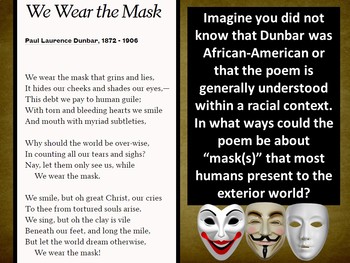


In the first verse, the mask is taken off. For example, wearing a mask hides our cheeks and.We wear the mask that grins and lies, It hides our cheeks and shades our eyes, This debt we pay to human guile With torn and bleeding hearts we smile, And mouth with myriad subtleties. This poem is specifically about how we wear the mask in order to make people see something that isnt true. We smile, but, O great Christ, our cries To thee from tortured souls arise.The poem has been cited as one of Dunbar's most famous poems. Why should the world be over-wise, In counting all our tears and sighs Nay, let them only see us, while We wear the mask. I put on a.It hides our cheeks and shades our eyes,—We wear the mask that grins and lies, It hides our cheeks and shades our eyes, This debt we pay to human guile With torn and bleeding hearts we smile, And mouth with myriad subtleties.
Across the three stanzas, the world is unaware of the struggle of black people. Braxton considers "We Wear the Mask" to be a protest poem which showed "strong racial pride". The poem is written from a "we" point of view, which represents the "black folk collective", according to Braxton.
We Wear the Mask happens to be one of the most critically appreciated poems of Paul Laurence Dunbar, and is studied in different educational domains.Peter Revell, Dunbar's biographer, described "We Wear the Mask" as "arguably the finest poem Dunbar produced" and drew parallels to the later Peau Noire Masques Blancs by Frantz Fanon. Du Bois in his work The Souls of Black Folk. Yeats, as well as civil rights activists such as W.

Cambridge University Press. The Cambridge History of African American Literature. Graham, Maryemma Ward Jr., Jerry W. ^ "Paul Laurence Dunbar". Undoubtedly would have—had nineteenth-century readers comprehended fully the poem's multiple meanings." Citations
The Collected Poetry of Paul Laurence Dunbar. Dunbar, Paul Laurence (1993). Kent, Ohio: Kent State University Press. We Wear the Mask: Paul Laurence Dunbar and the Politics of Representative Reality.
Braxton, Joanne Ramey, Lauri (), Richardson, Mark (ed.), "Paul Laurence Dunbar", The Cambridge Companion to American Poets (1 ed.), Cambridge University Press, pp. 136–143, doi: 10.1017/cco9781316403532.011, ISBN 978-3-2 , retrieved "We Wear the Mask: Irony in Dunbar's The Sport of the Gods". Boston: Twayne Publishers.


 0 kommentar(er)
0 kommentar(er)
